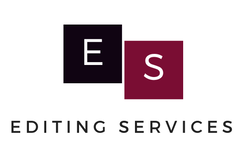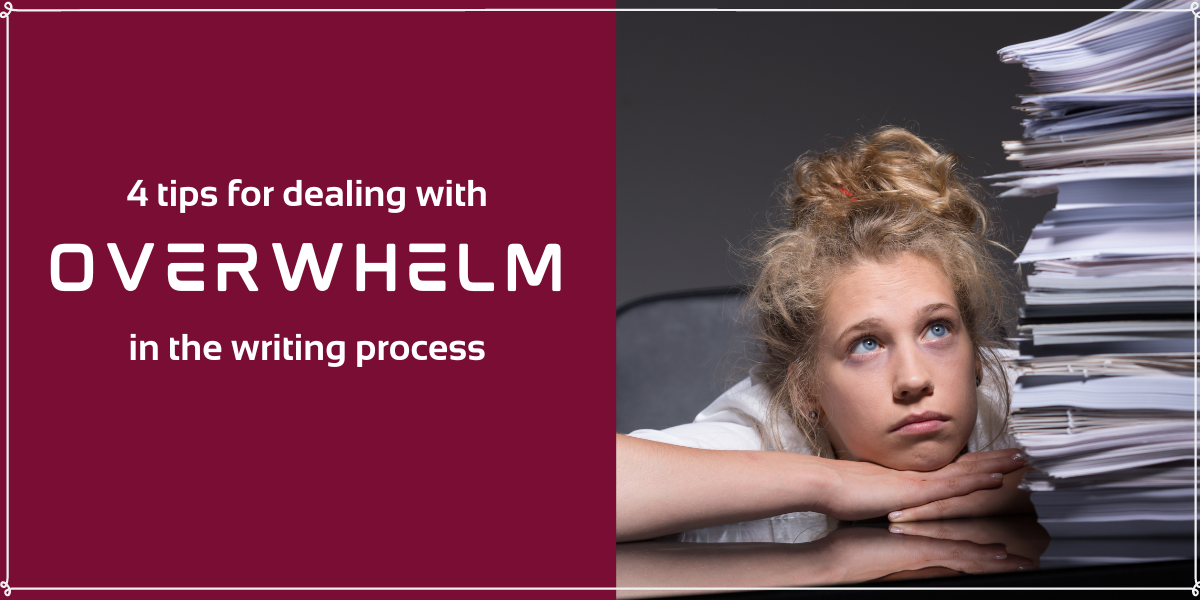E.S. Editing BlogUseful tips about editing, writing, creativity, reading, and the publishing industry
|
|
Feeling Overwhelmed Is Part of the Process
Being overwhelmed is not something to fight and get over and THEN start your writing. It’s a natural part of the writing process. Seeing the scope of your life or your expertise or whatever topic you feel called to write about may feel like a towering mountain stopping you in your tracks.
That stream of internal chatter builds layer upon layer of limiting thoughts.
Oh my god, what have I gotten myself into? I can’t do this. Who am I to write about anything? It’s all been done before, who wants to read another memoir, another business or productivity guide, another mommy blog, another story of overcoming challenges . . . The truth is, it has all been done before. And that’s been the case forever. In The Hero with a Thousand Faces Joseph Campbell writes about the Hero’s Journey and how it’s essentially a universal process told again and again in every great story. The underlying structure may be the same—venturing out into the unknown, undergoing a series of personal transformations, then returning as a new person—but the actual story itself has infinite variety. Nobody will tell the story of dealing with a divorce the same way you will. Nobody will tell the story of dealing with depression the same way you will. No one will write about your work or your expertise quite like you will. Your life, its insights, and how you express yourself will infuse the story in a way that’s never quite been done before.
Feeling Like an Impostor
Rest assured that every writer feels that heavy sense of being an impostor or the terror of possibly never being able to write another word again after a creative drought. This is part of the process. The dual demons of impostor syndrome and writer’s block are stone gargoyles that frame the entrance to your unconscious, the deep recesses of your imagination. It’s not that successful people never feel fear or anxiety; it’s that they do what they do in spite of it. They push through those feelings and do it anyway. Amy Cuddy, a social psychologist out of Harvard, gave a viral TED Talk called “Fake It Until You Become It.” The idea is that body language can change how you think and feel about yourself (what she calls “postural feedback” or “a body-mind nudge”). So even though you may feel like an impostor or “not enough,” or “not really a writer,” if you adopt powerful poses, ones that expand rather than contract, for just 2 minutes you will feel and act more confidently. Try adopting some of these high-power poses before your next writing session.
Make Stress Your Friend
Again, being overwhelmed is not something to deal with and vanquish before becoming a creative person. It is in fact putting your feet to the fire and giving you a springboard to launch yourself into the unknown. Kelly McGonigal explains in her amazing TED Talk “How to Make Stress Your Friend” that reframing stress as the body’s way of helping you deal with a challenge (instead of something bad that will eventually kill you) actually changes how your body responds to it. It’s only bad if you believe it is. The same thing can be said for feeling overwhelmed. When you feel that knot in your stomach, the fog emanating from the top of your head and blurring your thoughts, the dread of not seeing a path to begin . . . just sit with it. Actually feel it. Feel each separate aspect of your overwhelm as it shows up in your body and mind. Sit and let it exist. Feeling buried in material or suffocated by your loss of words, it’s all good. Say thanks, knowing that the key to unlocking your blocked energy is available to you and part of the writing process, too. Often going for a walk or doing something else allows your creative energy to simmer on the back-burner. All in good time.
Here are four ways I’ve found help me move through these moments.
#1 - Stop Focusing on the Content
You are the expert here. You know your content better than your readers. Avoid going down a rabbit hole of research, where you keep reading more and more books on your subject, perhaps as part of “market research.” Really what this is doing is pulling you out of doing your work and into “preparing to work.” Research can come later, but beware when research becomes resistance.
Instead of your content, think about how you will present your content. Think about the form that will best serve the book you want to write. What would be a good way to begin your book? If it’s a memoir, where in the timeline could you begin? Think about whether your book will have parts, chapters (how long or short), or a pastiche style? Consider how to frame your narrative. What stories or studies could open and close a chapter? If you feel stuck, go back to your outline, if you have one, and shift away from the what of your content to how you will present the content to best reflect the theme or reason for writing. #2 - Build Scaffolding, Then Take it Out Later
Often when we’re blocked or overwhelmed, we don’t allow ourselves to write. We get in our own way by self-critiquing while we try to write. The process of writing and revising are two separate tasks: they should never happen at the same time. First you write. Get your thoughts out of your head and on the page. Then you reflect and revise slightly before moving into the next wave of writing. Keep your revisions to a minimum while you’re writing your first draft. Once you have something to work with, the process of editing is like chiselling an artwork out of stone.
First you need the marble block. To get it, try scaffolding. The way I do this is by starting to write a letter to my ideal reader (or even myself). By the third or fourth sentence I’ll usually start my actual writing. Once you’ve written something, you typically notice that at some point you stop writing your scaffolding and start writing your work. Keep doing this every time you get stuck. Then delete all the scaffolding at the end once it’s served its purpose. Another way of conceiving of scaffolding is to write what you’re about to write, write it, and then summarize what you just wrote. You can delete the signposting later. The idea is to gain momentum so that your internal censor can’t catch up to you. #3 - Remember That You Already Have Everything You Need
You are probably drowning in content. You might have 15 journals filled margin to margin full of inspired musings scribbled in a burst of stream of consciousness that you can now barely read, but that may nonetheless be good starting content for a manuscript. Likewise, maybe you have technical documents or teaching materials from work you’ve done. Perhaps you have journal entries that helped you get through some difficult life event or trauma. You might have kept a diary since you were 12 and your basement is full of boxes.
These vessels of your writing contain amazing snapshots of some of the most inspiring and depressing moments of your life—the highest highs and the lowest, darkest lows. But these do not make a book. Rather, these writings can act as springboards to jog your memory, launch pads for framing your thoughts as stories, and flashpoints that readers can become immersed in. Journal entries on their own are ultimately for you; they hold parts of you in reserve that you can now call upon in the writing process. Let what speaks most compellingly emerge from the depths and write them into a form. #4 - Creativity Exists Within Constraints or It Perishes
Constraint is another great way of dealing with overwhelm. Instead of attempting to sit down and “write my book,” you set your timer for 25 minutes and write the opening of Chapter 5. There’s no rule that says you have to write your book in order. With programs like Scrivener, you can start anywhere and easily move things around later. All these tricks have the same ultimate goal: to get you started and to gain momentum. There's lots of talk about "writing sprints" and word count in the writing community. One great resource is the ebook by Chris Fox, "5000 Words Per Hour," which suggests starting with 5-minute sprints.
Breaking things down into bite-sized morsels will help you break through blocks. By deciding to work on the first section of your Intro this morning, you ward off the paralysis that comes with infinite possibility. |
Proud member of
|
Copyright © 2024 E.S. Editing Services
Privacy Policy |






Oh, I hope you'll see this comment - I want to thank you for this blog post. It's really helping me!
I tried the "scaffolding" idea and it WORKED. It unlocked me where I was stuck. The variant I chose was to write what I was about to write, and then write it. I didn't need to summarize it afterwards. I went into a beautiful stream-of-consciousness flow and later found that it didn't need much rewriting. A couple of stunning word pictures came to me during that session. I'm blown away, and you get all the credit. "Scaffolding". I will be trying this again and again - hopefully it wasn't a fluke that it worked so well the first time. :-)
Additionally, thank you for this thought: "Being overwhelmed is not something to fight and get over and THEN start your writing. It’s a natural part of the writing process."
Thank you so much for posting your helpful knowledge and suggestions. It's very much appreciated.
Hi Agathe!
I'm so happy the tip on scaffolding helped. I love using that too - it seems to make my internal censor leave me alone for a bit. It takes me a while to get into the swing of writing sometimes, and just having that little bit of leeway often brings me into a good frame of mind much faster.
As a perfectionist I can tell you that the insight of seeing overwhelm as part of the process and not something to fight was a revelation to me. I now can simply allow myself to feel it, acknowledge it, and then reframe it for myself. Not as something to fight, but perhaps not something to fear either. Something to manage and perhaps befriend.
I'm really happy that strategy resonated with you!
Well, your being a perfectionist resonates with me too, ha. I reviewed your paragraph about feeling like an imposter.
By the way, this - wow, beautiful: "The dual demons of impostor syndrome and writer’s block are stone gargoyles that frame the entrance to your unconscious, the deep recesses of your imagination."
I haven't seen Amy Cuddy's talk, but I will watch it. And I'm already integrating those high-power poses. I have a story to tell, and it's getting *told*, dang it! :-)
I like your writing tips. I want to write my memoirs. I'll have to hire a writer to do it for me.
Thank you for writing this post! It was really helpful.
Hey Paige! I'm glad to hear the post was helpful. :D
Leave a Reply.